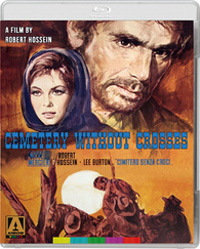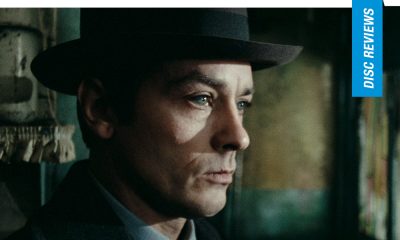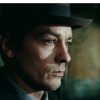Disc Reviews
Cemetery Without Crosses | Blu-ray Review
 Filmed during the height of the Euro Western craze of the late 60’s, Robert Hossein’s Cemetery Without Crosses is an obscure gem rejuvenated by Arrow Video. A French production, the title was actor/director Hossein’s first Western, obviously influenced by Sergio Leone, whom the film is dedicated to (Leone was in the midst of production on Once Upon a Time in the West when Hossein was underway with his feature). A simplistic and familiar narrative is enhanced by its inspired set designs and notable production value, featuring a winning score. Existing on the bleak end of the Spaghetti Western spectrum (or perhaps more aptly the ‘Baguette Western,” an Alex Cox coined term Ginette Vincendeau discusses in an included insert essay), it’s an entertaining bit of style over substance, and is an uncommon French entry in otherwise familiar climate. However, as much as Hossein pays homage to Leone, his Western shares several plot points with Sergio Corbucci’s excellent The Great Silence, which premiered a year previously in 1968.
Filmed during the height of the Euro Western craze of the late 60’s, Robert Hossein’s Cemetery Without Crosses is an obscure gem rejuvenated by Arrow Video. A French production, the title was actor/director Hossein’s first Western, obviously influenced by Sergio Leone, whom the film is dedicated to (Leone was in the midst of production on Once Upon a Time in the West when Hossein was underway with his feature). A simplistic and familiar narrative is enhanced by its inspired set designs and notable production value, featuring a winning score. Existing on the bleak end of the Spaghetti Western spectrum (or perhaps more aptly the ‘Baguette Western,” an Alex Cox coined term Ginette Vincendeau discusses in an included insert essay), it’s an entertaining bit of style over substance, and is an uncommon French entry in otherwise familiar climate. However, as much as Hossein pays homage to Leone, his Western shares several plot points with Sergio Corbucci’s excellent The Great Silence, which premiered a year previously in 1968.
After her husband is lynched by bandits right in front of her very eyes, Maria Caine (Michel Mercier) seeks vengeance by entreating an old friend, Manuel (Robert Hossein) for assistance in the matter. He’s at first reluctant. “You believe in vengeance. I don’t. It never ends,” he explains. Eventually, he agrees to infiltrate the gang of bandits and abduct the daughter (Anne-Marie Balin) of their leader. It seems clear Manuel and Maria have a romantic history together, enhancing the tragic finale during the final showdown between the bandits and the vengeance seekers.
Much of Cemetery Without Crosses seems significantly relevant to the period in which it was made, elements now forgotten or overlooked thanks to more iconic, similar examples. Dario Argento gets a writer credit here, but Claude Desailly and Hossein wrote the film, originally titled The Rope and the Colt. Hossein, best known for his role in Jules Dassin’s 1955 noir Rififi, was the son of composer Andrei Hossein, who wrote the expressive score for this title, which includes cult crooner Scott Walker.
At the time of filming, Hossein was quite a popular figure, as was his co-star, Michele Mercier. One of the most popular French actresses of the late 60s, Mercier was known for a series of films where she played a character named Angelique, spanning four films from 1964-1968 concerning a pulp heroine country girl turned courtesan (but she’s probably best remembered today for her turn in Mario Bava’s 1963 omnibus, Black Sabbath, appearing in the film’s notable lesbian stalker segment, “The Telephone”). Her role in Cemetery seems to be a deliberate move to navigate into other territories, but even with this title’s popularity, she was never quite able to shake the specter of Angelique (a comparable complaint of Austrian actress Romy Schneider’s difficulty moving beyond the blessing/curse of the Sissy series).
Hossein’s only major misstep, at least in light of his Leone inspiration, is the handling of the Mercier character, always in heavy make-up and at rather illogical instances (and the same goes for the film’s other major actress, Anne-Marie Balin). Leone prized realistic depiction of frontier women, and reputedly found most female characters in Westerns to be completely false, of which we get a large degree of here. Hossein tastefully implies they are both ‘raped,’ however, though he gives at least one of thema bit of agency with a surprising twist.
Disc Review:
Hossein shot the film in Southern Spain and the film’s deliberately stylized look is its greatest asset. Hiring DoP Henri Persin (the cinematographer behind those Angelique films), we get plenty of close-ups on the actors (perhaps explaining why Mercier tends to be favored), though the set-pieces are ultimately more memorable. Worthy of mention is film editor Marie-Sophie Dubus’ expert hand, as the film opens and closes with its enigmatic black and white sequence (her next project would be Melville’s Le Cercle Rouge, then Welles’ F for Fake, and eventually Zulawski’s Possession). Arrow’s enhanced release also features notable bonus features.
Remembering Sergio:
This brand new interview, filmed in February, 2015, was made exclusively for this Blu-ray release. Though at only five minutes in length, including footage from the film, this is a tad underwhelming, though Hossein speaks very energetically about his memories making the film.
Making of the Film:
An extract from the 1968 French TV program “Cinema,” this seven minute black and white segment features on-set footage and interviews with Hossein along with actors Serge Marquand and Michele Mercier.
Hossein Archive Interview:
This archive interview with Hossein was from the French TV program “Cote d’Azur Actualites,” and was first broadcast in April, 1968. The segment is very brief, about two and half minutes, and features the fatigued director speaking about his inspiration for the film and its recognition as the first French Western.
Final Thoughts:
A classic revenge narrative, Cemetery Without Crosses is an excellent find for those aficionados of the genre and period. It’s familiarity to other, greater films will perhaps always relegate it to the periphery, but it’s an excellent transfer and should serve to reinvigorate discussions concerning several notable figures involved in the production.
Film: ★★★/☆☆☆☆☆
Disc: ★★★★/☆☆☆☆☆


































